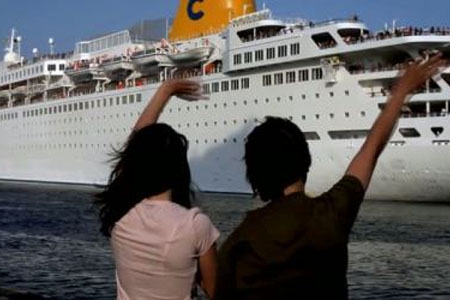“But surely Monsieur Godard, you must believe that films have a beginning, a middle, and an end.”
“Yes, but not necessarily in that order.”
So went the famous exchange between Georges Franju and J-L G some 48 odd years ago. That was back in the era of Bande à part and Une femme mariée—films whose wheeling narratives utterly discombobulated the auteur of Les yeux sans visage and Judex. With his most recent (and perhaps last) work, Film socialisme, Godard offers a film that does indeed have a beginning, a middle, and an end—yet is more baffling than anything he has ever made.
Title cards announce that as with his Numero Deux the spoken text will be largely quotations drawn from such as Walter Benjamin, Jacques Derrida, Hannah Arendt, Jean-Paul Sartre, Jean Giradoux, Charles Peguy, Luigi Pirandello, Samuel Beckett, Claude Lévi-Strauss, William Shakespeare, Martin Heidegger, Curzio Malaparte, and Jean Genet.
Finally, having arrived at Odessa we get the last sequence—which is about the most famous sequence of all-time—the Odessa Steps from Eisenstein’s ‘Battleship Potemkin.’ Outside of the shower bath murder in Hitchcock’s ‘Psycho’ I can’t think of another bit of film more familiar to non-cineastes.
We’re also informed that musical sections ranging from Phillipe Arthuys to Barbara will be in the offering along with sequences from Viaggio in Italia, Cheyenne Autumn, Pasolini’s Medea, Welles’ Don Quixote, L’Espoir, Adieu Bonaparte, The Battle of Marathon, and, most important of all, Jean-Daniel Pollet’s ultra-obscure poetic documentary Mediterranee, which also concerns the European diaspora.
“Money is a public good.
“Like Water.”
“Exactly.”
So say some introductory voices over a shot of the roiling sea. What follows, shot on film and varying gradations of video, unfolds on the soon-to-be-doomed Costa Concordia, a luxury liner cruising the Mediterranean with posts of call in Naples and Odessa. Fragments of an aborted drama of some sort unfold involving a wealthy Jewish businessman guilty of shady dealings of some sort during World War II, plus a great number of people—most middle-aged and small children—lolling about. Plus singer-poet Patti Smith wanders through either staring at the sea or singing a snatch of song. A beautiful African woman named Constance announces the theme “poor old Europe”—a region Godard sees as adrift in time, space and history.
This notion comes into sharper focus in the second section set at a family-run gas station somewhere in Le Midi whose chief inhabitants appear to be attractive young woman standing alongside gas pumps reading Balzac and a camera crew filming them for some undisclosed reason or other. Enigmatic non-sequesters are frequently voiced:
“I once encountered nothingness. It’s a lot thinner than you think.”
“You have to say ‘we’ in order to say ‘I.’”
“We don’t speak to those who use the term ‘to be.’”
At the end of this segment we’re informed that an “election” of some sort has taken place with the result turning the gas station-state into a “Federation.”
Finally, having arrived at Odessa we get the last sequence—which is about the most famous sequence of all-time—the Odessa Steps from Eisenstein’s Battleship Potemkin. Outside of the shower bath murder in Hitchcock’s Psycho I can’t think of another bit of film more familiar to non-cineastes. And here it is again, augmented by Godard visiting those steps as they are today: a tourist attraction as a direct result of Eisenstein. In short, actual history and film history are one and the same. And so Godard winds things all up with a montage of Finnegan’s Wake-like obscurity: Egyptian carvings, talking fish, shots of acrobats taken from an Agnès Varda film to which Godard has added readings from the Koran and the Torah on the soundtrack (obviously in the hope of promoting Peace), Chaplin playing the violin, Steve Reeves and Mylène Demongeot in the Jacques Tourneur / Mario Bava peplum epic, D-Day newsreels, Stalin in his coffin, bullfights in Barcelona, Nicole Stephane, Simone Weil, and shots culled from Youssef Chahine, John Ford, Pollet et.al. Finally we are solemnly informed “When the law is unfair justice precedes the law.”
Scene from Film Socialisme
Is this a threat or a promise? Hard to say, for this is followed by the FBI warning against copyright infringement (which Godard has been flagrantly violating throughout the film) and last but not least a title card: “No Comment.” This is in face a “call back” to an answer given by one of the film’s many children when questioned. But it’s Godard’s way of saying “Hail and Farewell.” There’s been quite enough comment, n’est-ce pas?




